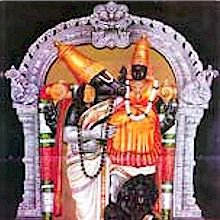 This post is actually a discussion that I had in Kavitha's blog on temples, but, I guess, is interesting enough to be a post in itself. It is about my visit to a historic temple, the first one after my stay in a foreign land which made me realise that temples in India, especially the ancient ones, are more than just places where you pray for your wishes to come true. This temple is special in that way because, during my visit I relived a short life with the belief system, priorities and way of life of our ancestors. It is a not life of faith, but a quest for the realisation of the absolute truth. It is a life of attaining eternal greatness by discipline.
This post is actually a discussion that I had in Kavitha's blog on temples, but, I guess, is interesting enough to be a post in itself. It is about my visit to a historic temple, the first one after my stay in a foreign land which made me realise that temples in India, especially the ancient ones, are more than just places where you pray for your wishes to come true. This temple is special in that way because, during my visit I relived a short life with the belief system, priorities and way of life of our ancestors. It is a not life of faith, but a quest for the realisation of the absolute truth. It is a life of attaining eternal greatness by discipline.Tiruvidavaenthai is more commonly known as Tiruvidanthai. It is on the East Coast Road, about 7-10 km from Tiruvanmiyur, Chennai. That is if my math is not too bad. The temple is one of the 108 Tirupathi's of Lord Vishnu. Its sanctum sanctorium has Lord Vishnu as Nitya Kalyana Perumal. He gives darshan as a Varaham. He holds Komalavalli Thayar on his left thigh balancing his left feet on Adiseshan. Pretty amazing! It also has a separate Sannidhi (as I am used to call it) for Komalavalli Thayar in her full bridal costume.
The story behind his name is also interesting. In Tiruvidanthai, lived a saint called Kavala Muni with his daughters. 360 of them! He prayed for the lord to marry them, and the Lord kindly obliged, marrying one each day, for a year. Thus the name Nitya Kalyana Perumal. At the end of the year, he merged all into one Komalavalli thayar.
The temple is very good and I guess is one of the temples better protected by the Archeological Survey of India. The outer walls of the sanctum are still inscribed with Tamil, clearly of the (g)olden days. Though I couldn't understand any (and I consider myself not too bad in reading Tamil). What else? There is a shed, possibly for the Ther, right after the Dwajasthampam (the flag made out of stone, if I may say so). Its actually pretty dilapidated. And there were two mandapams, one right at the outer entrance, and one to the left of the Dwajasthampan as you enter the outer entrance. To the right was more facts by ASI about the kings who ruled when it was constructed and other interesting things that I dutifuly forgot.
The temple's tank is about a five minute walk down the approach road from the temple. It is reasonably big. Honestly, I didn't have a chance to stop and look if the tank is any good. But the temple sure is very peaceful. No disrespects, but I would any day prefer Tiruvidanthai to any other Divya desam, or for that matter a temple, which may be more crowded all round the year. If only I was not this far from the temple!
11 comments:
This is a good one!
I liked it a lot
i have visited this temple
I came to know about your blog from Subash working in Indusrad...
hey Badri! punctuating the floor plan of the temple was really good! i never knew abt this temple :D:) Badri, I could see your point on the kind of strange yet peaceful accord you got from the old temple.
Thanks Anand. If you are here. Like many other temples belonging to Divya Desam, even this is very less known.
Do you know that the more famous Parthasarathy temple in Triplicane is one of the 108 Divya Desam (otherwise called Tirupathi?). May mom has actually visited about 102 of them and told me that many of them are not that well maintained. A little sad.
They deserve maintanance, if not for the spiritual value, at least for the fact that these structures are very old
padikave romba sandhoshamaa irukku badhri!!
well, i dont know but i think it is dhujastambam and not dwaja..
u check somewhere !!
PeyarkkAraNam therinthAl viLakkuga
Forgive my ignorance, but what do you mean by the temple's "tank"?
You can assume that a temple's tank is a man made pond, with stairs leading down to them from all the four sides, which is traditionally meant to facilitate devoutees to bathe before they visit the sanctum. Nowadays, I guess it serves more to relax.
May be you can google for Indian temples to have an idea.
Thanks Badhri!
I think, The major problem with Hindu system is most of the aanmeegam (Super natural related things) are explained using analogy. but people stick to analogy than what they were really trying to say. May be, Aanmeegam can only be shown by analogy than concrete definitions. Either way, we can argue, general people are not intelligent enough to understand the system or the system is not intelligent enough to enlighten the general public.
It is Dwajasthambam. In tamil we call it Kodi Maran. It is the exact translation. Lord Vishnu is Garuda dwajan : One who has Garuda in His flag. So it literally means flag post : sthambam = post/ pole/
Dwaja =flag..
Wow! Really! I didn't know that!
Post a Comment